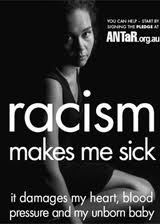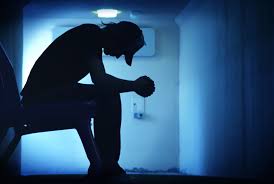Aboriginal health and racism : What are the impacts of racism on Aboriginal health ?
NACCHO Aboriginal health and racism : What are the impacts of racism on Aboriginal health ?
“On an individual level, exposure to racism is associated with psychological distress, depression, poor quality of life, and substance misuse, all of which contribute significantly to the overall ill-health experienced by Aboriginal and Torres Strait Islander people.
Prolonged experience of stress can also have physical health effects, such as on the immune, endocrine and cardiovascular systems.”
Pat Anderson is chairwoman of the Lowitja Institute, Australia’s National Institute for Aboriginal and Torres Strait Islander Health Research (and a former chair of NACCHO) see her opinion article below
“If you (Indigenous patient) go to a health service and you’re made to feel unwelcome, or uncomfortable or not deserving or prejudged and there are lots of scenarios of Aborginal people being considered to be perhaps being seriously intoxicated when in fact they’ve been seriously ill.”
Romlie Mokak CEO Australian Indigenous Doctors Association
JUST ADDED 3 March VACCHO POSITION PAPER Health and Racism
It’s well known that Indigenous Australians have much lower life expectancy than other Australians, and have disproportionately high rates of diseases and other health problems.
Could that in part be due to racism?
Would cultural awareness training for health professionals would reduce the incidence of racism ?
Should governments acknowledge and address the impact of factors such as racism on health outcomes?
These are some of the question being asked in the health and community sectors, amid reports of a rise in racist incidents.
How racism affects health
The impact of racism on the health of Aboriginal and Torres Strait Islander people can be seen in:
- inequitable and reduced access to the resources required for health (employment, education, housing, medical care, etc)
- inequitable exposure to risk factors associated with ill-health (junk food, toxic substances, dangerous goods)
- stress and negative emotional/cognitive reactions which have negative impacts on mental health as well as affecting the immune, endocrine, cardiovascular and other physiological systems
- engagement in unhealthy activities (smoking, alcohol and drug use)
- disengagement from healthy activities (sleep, exercise, taking medications)
- physical injury via racially motivated assault
HOW DO WE BUILD A HEALTH SYSTEM THAT IS NOT
World news radio Santilla Chingaipe recently interviewed a number of health organisations
It’s well known that Indigenous Australians have much lower life expectancy than other Australians, and have disproportionately high rates of diseases and other health problems.
Could that in part be due to racism?
The Social Determinants of Health Alliance is a group of Australian health, social services and public policy organisations.
It lobbies for action to reduce inequalities in the outcomes from health service delivery.
Chair of the Alliance, Martin Laverty, has no doubt racism sometimes comes into play when Indigenous Australians seek medical attention.
“When an Indigenous person is admitted to hospital, they face twice the risk of death through a coronary event than a non-Indigenous person and concerningly, Indigenous people when having a coronary event in hospital are 40 percent less likely to receive a stent* or a coronary angiplasty. The reason for this is that good intentions, institutional racism is resulting in Indigenous people not always receiving the care that they need from Australia’s hospital system.”
Romlie Mokak is the chief executive of the Australian Indigenous Doctors’ Association.
Mr Mokak says the burden of ill health is already greater amongst Indigenous people – but this isn’t recognised when they go to access health services.
“Whereas Aboriginal people may present to hospitals often later and sicker, the sort of treatment they might get once in hospital, is not necessarily reflect that higher level of ill health. We’ve got to ask some questions there and why is it that the sickest people are not necessary getting the equitable access to healthcare.”
Mr Mokak says many Indigenous people are victims of prejudice when seeking medical services.
“If you (Indigenous patient) go to a health service and you’re made to feel unwelcome, or uncomfortable or not deserving or prejudged and there are lots of scenarios of Aboriginal people being considered to be perhaps being seriously intoxicated when in fact they’ve been seriously ill.”
But Romlie Mokak from the Australian Indigenous Doctors Association says the onus shouldn’t be on the federal government alone to improve the situation.
He suggests cultural awareness training for health professionals would reduce the incidence of racism.
“Not only is it at the point of the practitioner, but it’s the point of the institution that Aboriginal people must feel that they are in a safe environment. In order to do this, it’s not simply that Aboriginal people should feel resilient and be able to survive these wider systems, but those services really need to have staff that have a strong understanding of Aboriginal people’s culture, history, lived experience and the sorts of health concerns they might have and ways of working competently with Aboriginal people.”
Martin Laverty says at a recent conference, data was presented suggesting an increase in the number of Australians experiencing racism.
And he says one of the results is an increase in psychological illnesses.
“We saw evidence that said about 10 percent of the Australian population in 2004 was reporting regular occurences of individual acts of racism and that that has now double to being close to 20 percent of the Australian population reporting regular occurences of racism. We then saw evidence that the consequences of this are increased psychological illnesses. Psychological illnesses tied directly to a person’s exposure to racism and discrimination and that this is having direct cost impacts of the Australian mental health and broader acute health system.”
Mr Laverty says it’s time governments acknowledged and addressed the impact of factors such as racism on health outcomes.
He says a good start would be to implement the findings of a Senate inquiry into the social determinants of health, released last year.
“In the country of the fair go, we should be seeing Australian governments, Australian communities acting and indentifying these triggers of racism that are causing ill health and recognising that this is not just something the health system that needs to respond to, but the Australian government can respond by implementing the Senate inquiry of March 2013 that outlines the set of steps that can be taken to overcome these detriments of poor social determinants of health.”
Racism a driver of Aboriginal ill health
On an individual level, exposure to racism is associated with psychological distress, depression, poor quality of life, and substance misuse, all of which contribute significantly to the overall ill-health experienced by Aboriginal and Torres Strait Islander people. Prolonged experience of stress can also have physical health effects, such as on the immune, endocrine and cardiovascular systems.
Pat Anderson is chairwoman of the Lowitja Institute, Australia’s National Institute for Aboriginal and Torres Strait Islander Health Research (and a former chair of NACCHO)
As published in The Australian OPINION originally published in NACCHO July 2013
In July 2013, the former federal government launched its new National Aboriginal and Torres Strait Islander Health Plan.
As with all such plans, much depends on how it is implemented. With the details of how it is to be turned into meaningful action yet to be worked out, many Aboriginal and Torres Strait Islander people, communities and organisations and others will be reserving their judgment.
Nevertheless, there is one area in which this plan breaks new ground, and that is its identification of racism as a key driver of ill-health.
This may be surprising to many Australians. The common perception seems to be that racism directed towards Aboriginal and Torres Strait Islander people is regrettable, but that such incidents are isolated, trivial and essentially harmless.
Such views were commonly expressed, for example, following the racial abuse of Sydney Swans footballer Adam Goodes earlier this year.
However, the new health plan has got it right on this point, and it is worth looking in more detail at how and why.
So how common are racist behaviours, including speech, directed at Aboriginal and Torres Strait Islander people?
A key study in Victoria in 2010-11, funded by the Lowitja Institute, documented very high levels of racism experienced by Aboriginal Victorians.
It found that of the 755 Aboriginal Victorians surveyed, almost all (97 per cent) reported experiencing racism in the previous year. This included a range of behaviours from being called racist names, teased or hearing jokes or comments that stereotyped Aboriginal people (92 per cent); being sworn at, verbally abused or subjected to offensive gestures because of their race (84 per cent); being spat at, hit or threatened because of their race (67 per cent); to having their property vandalised because of race (54 per cent).
Significantly, more than 70 per cent of those surveyed experienced eight or more such incidents in the previous 12 months.
Other studies have found high levels of exposure to racist behaviours and language.
Such statistics describe the reality of the lived experience of Aboriginal and Torres Strait Islander people. Most Australians would no doubt agree this level of racist abuse and violence is unwarranted and objectionable. It infringes upon our rights – not just our rights as indigenous people but also our legal rights as Australian citizens.
But is it actually harmful? Is it a health issue? Studies in Australia echo findings from around the world that show the experience of racism is significantly related to poor physical and mental health.
There are several ways in which racism has a negative effect on Aboriginal and Torres Strait Islander people’s health.
First, on an individual level, exposure to racism is associated with psychological distress, depression, poor quality of life, and substance misuse, all of which contribute significantly to the overall ill-health experienced by Aboriginal and Torres Strait Islander people. Prolonged experience of stress can also have physical health effects, such as on the immune, endocrine and cardiovascular systems.
Second, Aboriginal and Torres Strait Islander people may be reluctant to seek much-needed health, housing, welfare or other services from providers they perceive to be unwelcoming or who they feel may hold negative stereotypes about them.
Last, there is a growing body of evidence that the health system itself does not provide the same level of care to indigenous people as to other Australians. This systemic racism is not necessarily the result of individual ill-will by health practitioners, but a reflection of inappropriate assumptions made about the health or behaviour of people belonging to a particular group.
What the research tells us, then, is that racism is not rare and it is not harmless: it is a deeply embedded pattern of events and behaviours that significantly contribute to the ill-health suffered by all Aboriginal and Torres Strait Islander Australians.
Tackling these issues is not easy. The first step is for governments to understand racism does have an impact on our health and to take action accordingly. Tackling racism provides governments with an opportunity to make better progress on their commitments to Close the Gap, as the campaign is known, in Aboriginal and Torres Strait Islander health. The new plan has begun this process, but it needs to be backed up with evidence-based action.
Second, as a nation we need to open up the debate about racism and its effects.
The recognition of Aboriginal and Torres Strait Islander peoples in the Constitution is important for many reasons, not least because it could lead to improved stewardship and governance for Aboriginal and Torres Strait Islander health (as explored in a recent Lowitja Institute paper, “Legally Invisible”).
However, the process around constitutional recognition provides us with an opportunity to have this difficult but necessary conversation about racism and the relationship between Australia’s First Peoples and those who have arrived in this country more recently. Needless to say, this conversation needs to be conducted respectfully, in a way that is based on the evidence and on respect for the diverse experiences of all Australians.
Last, we need to educate all Australians, especially young people, that discriminatory remarks, however casual or apparently light-hearted or off-the-cuff, have implications for other people’s health.
Whatever approaches we adopt, they must be based on the recognition that people cannot thrive if they are not connected.
Aboriginal and Torres Strait Islander people need to be connected with their own families, communities and cultures. We must also feel connected to the rest of society. Racism cuts that connection.
At the same time, racism cuts off all Australians from the unique insights and experiences that we, the nation’s First Peoples, have to offer.
Seen this way, recognising and tackling racism is about creating a healthier, happier and better nation in which all can thrive.
Pat Anderson is chairwoman of the Lowitja Institute, Australia’s National Institute for Aboriginal and Torres Strait Islander Health Research




No comments yet.